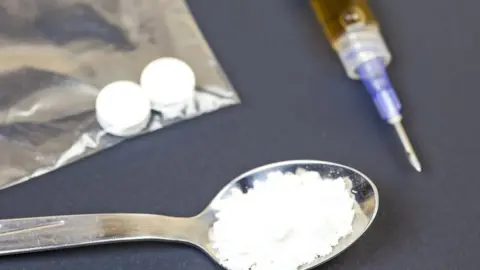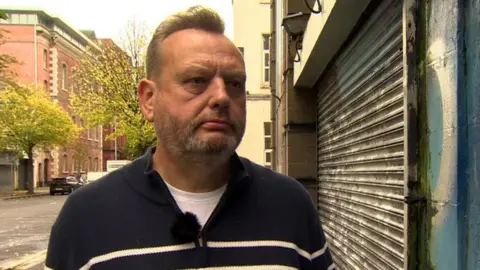Nitazenes: Super strength street drugs linked to multiple NI deaths
 Getty Images
Getty ImagesSuper strength street drugs which are "500 times stronger than morphine" have been linked to multiple deaths across Northern Ireland for the first time, a coroner has said.
The Public Health Agency (PHA) warned in July that new synthetic opioids Nitazenes may be in Belfast.
They have now been implicated in the deaths of six people, with an average age of 28, BBC News NI can reveal.
The death toll may rise as more tests are carried out.
Coroner Joe McCrisken's findings also reveal that the drug which he says is "a serious danger to public health" has been circulating in Northern Ireland since April 2022 when the first known death occurred.
Local drug addiction services say the coroner's findings reinforce the need for more rapid intervention and testing to tackle a synthetic drugs problem that they fear could spiral out of control.

What are Nitazenes?
Nitazenes were first developed in the 1950s as a pain-killing medication but are so potent and addictive they have never been approved for medical or therapeutic use.
In recent years, they have been linked to thousands of deaths in the United States.
In 2019, it was reported that, unknown to users, they were being cut and spliced into heroin, cocaine, and street pills.
Injected, inhaled or swallowed, mixing them with other drugs and alcohol is extremely dangerous and significantly increases the risk of overdose and death.
The Public Health Agency (PHA) in Northern Ireland said this category of new synthetic opioids has "varying levels of potency that can have damaging effects to the body".
It added that most fatal overdoses involve the use of more than one type of drug, and any combination of prescription drugs, over-the-counter drugs, illicit drugs and alcohol can be dangerous.
"Mixing different types of drugs is unpredictable, can increase the toxicity of already potentially harmful substances and increases the risk of serious harm."
Earlier this year, public health warnings were issued in relation to Nitazene abuse in parts of Scotland and the Midlands, in England, after a sharp rise in drug overdoses and deaths.

Group director of therapeutic and wellbeing services at Inspire, in Belfast, Alex Bunting, told BBC News NI news of the six deaths is further confirmation that a global synthetic drugs crisis has reached Northern Ireland.
Mr Bunting said this will add to an already significant substance abuse problem.
"We need earlier and more rapid testing," he said.
"We also need more funding for our mental health and substance abuse strategy."
'Game changer'
Gary McMichael, chief executive of the charity ASCERT, which offers alcohol and drug addiction support services across Northern Ireland, believes Nitazenes are a game changer in terms of the risk of serious harm, overdose, and death.
"People are taking them not realising just how significantly stronger they are than other drugs and, in many cases, they don't actually know what they're taking or what it's going to do to them because they're wrapped into pills or into heroin or other powders."

Mr McMichael said all agencies need to move quickly to prevent further tragedies.
"We know what's coming down the line at us so this is the time to get a strategy in place," he said.
"People who are vulnerable are becoming even more vulnerable because of funding cuts, because of the restrictions in budgets so the supports, the safety nets, are under stress.
"We're seeing a pressure on resources and on top of that we also have a culture in NI of people using drugs in combination with others which increases the risk."
If you have been affected by addiction, help and support is available at BBC Action Line.
If you live in Northern Ireland, you can also call Lifeline, a 24 hour helpline on 0808 808 8000.
You can watch Spotlight: Deadly Little Pills on BBC iPlayer.
